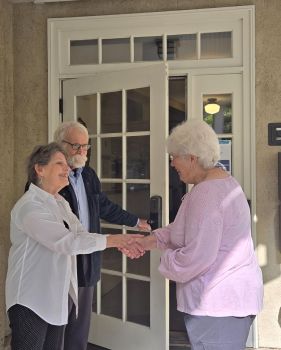Welcome!

Folks come to us looking for a spiritual home. Please visit. Quakers believe in the presence of God in everyone. Regardless of race, nationality, ethnicity, gender, sexual orientation, or reason, you will find a warm welcome from us.
In addition to our belief in that of God in everyone, we believe in direct communion with the Divine. In other words, Spirit speaks and guide us directly. Our worship is in silence as we wait expectantly for that connection.
In worship we gather in silence, quiet our minds, calm our hearts, and seek the source of love and truth in our lives. At times, Friends feel called to stand and speak a message given from the divine.
We eagerly welcome believers of all faiths as fellow members of God's universal community. Our Meeting for Worship service, Sundays at 9:30 AM, is open to everyone in person and on a Zoom link. We also have Worship on Wednesday evenings at 8PM on the same Zoom link.
We enter our worship rooms quietly. The worship begins as you enter in silence. There are no assigned seats. We do not have a pastor who leads us.
We Quakers bear witness to our core beliefs through direct action on a variety of social concerns, like housing the homeless, supporting food banks, and standing vigil for peace. We work locally, nationally, and internationally. Quakers often say, “Our service begins when worship ends.”
For Information on how to join worship via ZOOM, you can click here. You can expect a warm welcome and meaningful worship.
Click here for Childcare and Youth programs.
Click here for Frequently Asked Questions (FAQ’s).
Contact our Office Manager: Rochelle Tormollen, Address: 1101 DeKalb Pike, Gwynedd, PA 19454, Phone: 215-699-3055,
Email: office@GwyneddMeeting.org Your calls and emails will be returned.